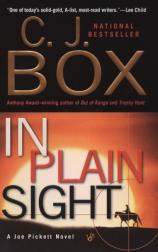In Plain Sight
Review
In Plain Sight
C. J. Box's novels featuring Wyoming game warden Joe Pickett have a
richness about them while being infused throughout with a sense of
truth, capturing at once both the tranquility and sudden violence
that one encounters in nature at all of its levels. Box's
presentation is evenhanded --- those with business or environmental
concerns will find both support and opposition for either position
--- and never gets in the way of his own story, which at its most
basic is about the ongoing struggle of a good man interacting with
the quiet evil around him.
Pickett is a bit of an Everyman. He's not so much an underachiever
as a man with limited talents and gifts, shortcomings balanced by
determination and a sense of right and wrong that never falters.
He's the antithesis of a political animal, and while that is not
necessarily a shortcoming in the real world, it is the kiss of
death for anyone who ostensibly seeks a career in government
service. This stark reality is brought to the foreground within the
pages of IN PLAIN SIGHT, the latest of the Pickett novels.
IN PLAIN SIGHT proceeds along twin tracks, both of which involve
Pickett and will dramatically affect his future. The first concerns
the wealthy Scarlett family, a long-established presence in rural
Colorado whose influence extends to the state capital in Denver and
beyond. The sudden disappearance of Opal Scarlett, the family
matriarch, sparks the already-smoldering feud between Arlen and
Hank Scarlett, two of her three adult sons. Arlen and Hank are
successes in their respective rights, and both see themselves as
the heir apparent to the family fortune and influence. Wyatt, the
third son, is buffeted between his two brothers, outclassed
intellectually and emotionally, but is not without primitive,
unexpected resources of his own.
When the local community begins taking sides, Pickett finds himself
caught uneasily in the middle --- not only between the warring
Arlen and Hank but also between local law enforcement and Randy
Pope, Pickett's boss and adversary. Pope, in particular, is riding
herd on Pickett, inflicting upon him the governmental equivalent of
"the death of a thousand cuts" in the hope that he'll eventually
quit or give cause to fire him.
Meanwhile, there is a dangerous and malevolent force that has
visited the area in the form of John Wayne Keeley, a homicidal
sociopath whose motivation for living is a seething anger fueled by
his desire for revenge against Pickett for what he believes are
wrongs occasioned by Pickett against his family. When Keeley
quietly and expertly interjects himself into the midst of the
Scarlett family dispute, Pickett suddenly finds himself under
attack from a seemingly invisible foe who has no limits with
respect to what he is capable of doing. As events move forward and
intersect on their way to an apocalyptic ending, Pickett must
marshal what few resources he has, not only to save himself but
also to preserve those whom he holds most dear.
Often outclassed and always outgunned, Pickett has all the best
qualities of the archetypal figure whom we have come to know as a
"hero." Often a victim of his own limitations, and done in almost
as much by his shortcomings as by his adversaries, Pickett
steadfastly refuses to go along to get along if such a course
results in a compromising of his principles. The results are
cataclysmic; as Pickett notes parenthetically near the end,
"everything will be different." Box may have dropped a hint or two
throughout the book, but there is no doubt that the next novel in
this thoughtful, dramatic series will present changes and
challenges, good and otherwise, to Pickett's world.
No matter. The Pickett novels, at heart, are not so properly
classified as mysteries or works of suspense as they are modern
westerns, in the finest sense of that term. Arguably, Box is
steadily staking his claim as the heir apparent to such masters of
the genre as Zane Gray and Louis L' Amour. IN PLAIN SIGHT is the
strongest argument to date in favor of that proposition.
Reviewed by Joe Hartlaub on January 22, 2011





